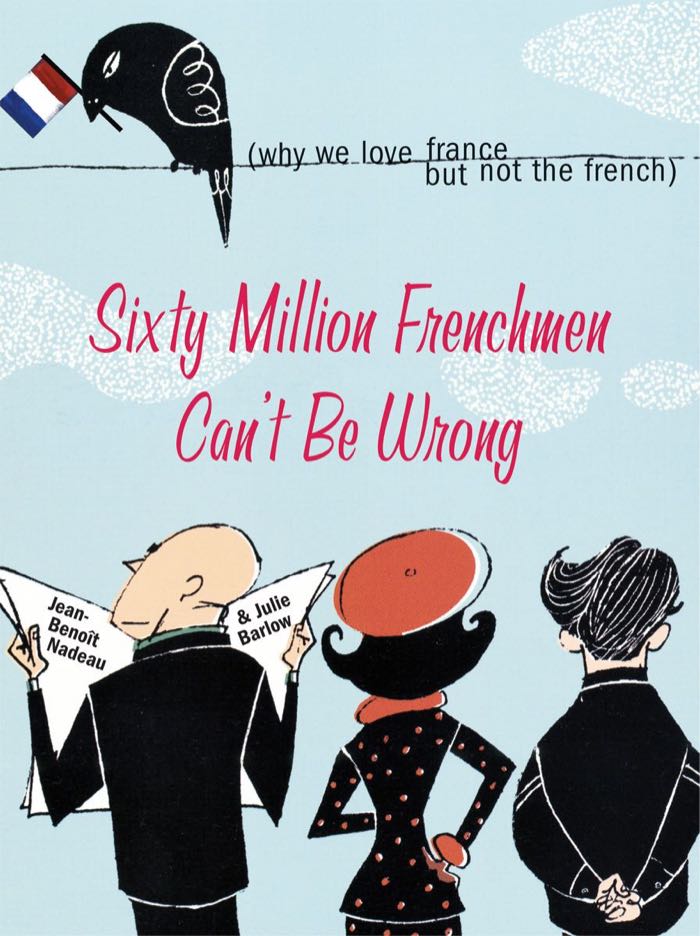Sixty Million Frenchmen Can't Be Wrong: Why We Love France But Not the French
Reviewed date: 2013 Mar 3
351 pages
I always wondered why the US and France seem to rankle each other, when history suggests that we have so much in common. The French Revolution and the French democratic ideals seem similar to American ideals of liberty and democracy, even if we disagree on the details. So I figured I should get a book, learn more about the French, and then I would come to appreciate them more.
Well, now I know a bit more about the French. I'm not an expert, obviously, but Sixty Million Frenchmen Can't Be Wrong taught me a bit more about France, the French, and how they think. And whereas before I was confused by the French but largely admired France, now I know that, at heart, the French are horrible people.
Nadeau and Barlow break their book into short chapters that explain one aspect of French culture or history. It's a good introduction. I'll try to summarize each chapter in a sentence or two.
- The French are the aborigines, the original inhabitants of the land.
- The French have a real and meaningful connection with the land and the local area/village/culture/ethnicity where they are from.
- Rules of etiquette and politeness in France are different than in other cultures. E.g., in France it's rude to ask someone his name. One's occupation is an impolite topic of conversation. When entering a store, politeness requires you to greet the shopkeeper.
- The French appreciate Grandeur. They respect those who wield power, and expect them to use it to great effect.
- The art of rhetoric is valued to the point where a clever word or phrase can distract the press and the public from matter of real corruption.
- The French hate compromise. Their governments have been a series of tyrannies; their democracies are a tyranny of the majority. Brutal, bloody regime change is the norm.
- In World War II, the French collaborated with the German occupiers, because they preferred to have French titularly in charge, rather than allow Germany to completely take over.
- The war in Algeria--which was a last grasp at colonialism--affects France greatly. Over 1 million European French refugees fled from Algeria to France.
- The French presidency is extraordinarily, dangerously, powerful.
- The State created France. It runs France, it is France. It created and defines French culture, language, art, etc. The 3 Principles are: Assimilation, the General Interest, and Equality.
- No local government, only local administration. All power flows from Paris
- Language was created/promoted/defined to create a French identity. The French truly believe their language is richer and better than all others. They emphasize speaking correctly, and it's not considered rude to correct someone's grammar publicly.
- France is run by a technocracy of enarques produced by ENA. They take all the best civil service jobs. It's better than the system of nepotism and class that it replaced--at least this way, the elite class may actually be elite.
- Napoleon created modern France. He created the civil and criminal code, and the administrative law. Napoleonic Civil code is analogous to Common Law, but radically different: where Common Law looks at precedent and then principles, the Civil Code starts with principles and works out a verdict by logic.
- The French are suspicious of private associations and charity, but there are a lot more of them than even the French suspect. Their charities don't stay out of politics--Doctors Without Borders certainly isn't neutral like the Red Cross.
- There is a public toleration for violent, destructive protests. The French have a "general disrespect for the law."
- Social rights to the French are as individual rights to Americans. Poverty and disadvantage are system failures.
- France invented Minitel, an amazing nationwide computerized network the existed before the Internet.
- French resistance to "globalization" is really anti-Americanism.
- France's racism problem stems from a downtrodden immigrant population from North Africa, but France's commitment to assimilation keeps them from even admitting or understanding the problem. All French citizens are simply French, end of story. Multiculturalism is not valued because it threatens the French identity.
- A slow development of political checks and balances. It's getting better.
- France is giving up some sovereignty and making compromising to help weave an integrated Europe, which will make war impossible and impractical.
